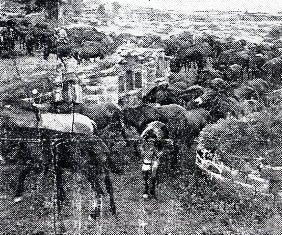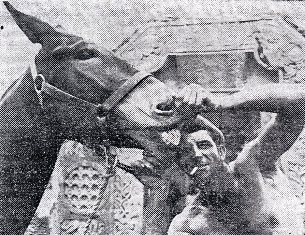

|
Patient Animals Over The Road
Tired, Wounded But Undaunted
By SGT. JOHN McDOWELL Roundup Staff Writer
ALONG THE BURMA ROAD (CHINA) - Upon patient questioning, Molly will admit with a sad toss of her head that the life of an adventuress isn't always an easy one.
Eight times wounded in battle, long-eared Molly has come a long way for a lady since she joined the Army six years ago. When I met her high in the tumbled hills of Yunnan, she was but a shadow of the belle who once had frolicked in the rolling green pastures of Missouri.
Her gaunt torso was ribboned with the stark pattern of her ribs. Protruding vertebrae along her broad back suggested a bas-relief map of the Himalayas. Her shabby brown coat was ragged, dusty and travel-worn.
And small wonder, Molly's lifetime itinerary reads like a Haliburton travelogue: Missouri to Texas; Texas to Panama; Panama to Colorado; Colorado to New Orleans; New Orleans to Calcutta; Calcutta to Ledo; Ledo to Myitkyina; Myitkyina to Lashio; Lashio to Myitkyina. And now a new chapter to Molly's saga - Myitkyina to Kunming - is being written. And after Kunming? Molly shakes her head with sophisticated boredom when considering her future, and her shrewd, brown eyes seem to say wearily, "Kismet, Kismet."
WORTH $5,000
Molly is Empress Dowager of the most valuable herd of mules that ever kicked their collective heels high in the air with perverse abandon. For Molly and her fellow Missouri blue-bloods - all of them Quartermaster Pack Troop and Mule Pack Artillery veterans of the Burma jungle campaigns - have, during their wide and extensive travels, accumulated an estimated value of $5,000 each. The $5,000 price tag is purely an intrinsic figure, based on what Uncle Sam has paid to bring each mule 14,000 miles around the world.
The story of the year-long mission of the men and mules of the Quartermaster and Field Artillery pack outfits constitutes one of the great records of endurance to come out of this war.
 Tired veterans of the Burma campaigns, these mules of a Field Artillery Pack outfit are given a well-deserved "break"
during their march to Kunming to graze in a Chinese cemetery. In China, the mules will be turned over to the Chinese
armies.
Tired veterans of the Burma campaigns, these mules of a Field Artillery Pack outfit are given a well-deserved "break"
during their march to Kunming to graze in a Chinese cemetery. In China, the mules will be turned over to the Chinese
armies.
|
Lt. B. F. Kidd, a cattle rancher in Menard, Tex., before joining the Army and becoming company commander of a QM pack unit, estimated that by the time his men reach Kunming they will have walked 2,300 miles since leaving the United States in August 1944.
RODE ACROSS OCEAN
The young, wiry lieutenant, seated in a dingy Chinese restaurant outside the ancient walled town of Hsiakwan on the Burma Road, grinned and modified his statement, "Of course," he said, "we didn't march the mules across the ocean. We started walking up The Road with 'em from Ledo last October."
Kidd's muleskinners - tired, dusty men bronzed by long months on the trail - laughed loudly, Sgt. Ernie Mutch - who later admitted he had gone into the rodeo games "when my Old Man in Browning, Mont., got tired of feedin' me - poured a shot of Vodka from a tall bottle and said, "Maybe we didn't march them goddamn critters across the ocean, but I'll be damned of they'll ever get me and a bunch of mules together on the same boat again. Once was enough."
Pfc. Raymond J. Coulombe of Fall River, Mass., who had ridden Molly since she recovered from shrapnel wounds received when Mars Task Force - to which both the QM and Artillery pack outfits were attached - engaged the Japs in the Battle of Hosi Valley during the Central Burma campaign, came to the defense of the mules. "I don't know. The mules weren't too bad to handle on the boat," he said.
"Maybe not, but when it comes to eatin' and sleepin' with 'em, I lose my affection damn fast," Mutch said.
T/Sgt. Luke A. Reed, a grizzled cowpuncher from Ringling, Okla., broke into the conversation. "Say what you want, these mules have got plenty of savvy," he said. "Take my mule Grandpa...." Everyone groaned, and across the table T/5 William E. Sweeney of El Monte, Calif., said, "Hell, don't start in on that old goat again."
But reed continued. grandpa, O soon learned, was a battle-wise graybeard that had marched up into Burma with Merrill's Marauders. A veteran of the entire North and Central Burma campaigns, with an insatiable hunger for K-Ration cheese and C-Ration crackers, Grandpa had been wounded seven times. "Still the best mules in the Army, though," Reed concluded.
Kidd's outfit is but one of a series of Quartermaster and Artillery mule pack units stretched along the Burma Road for nearly 200 miles, all moving toward Kunming. The outfits have been on The Road since leaving Myitkyina in late May. The first of the mules, the men on the road estimate, will arrive in Kunming by mid-August.
JOIN MARSMEN
Actually, the trek to Kunming began in Ledo last October when the mule-skinners unloaded the mules from boxcars after a 700-mile train ride from the port of Calcutta and headed up the Ledo Road into Burma. At Myitkyina, after struggling for three weeks through the monsoon-flooded Mogaung Valley, the mule pack outfits joined the Mars Task Force.
By Christmas Day the mule-skinners had moved down into Central Burma's jungled hill country with the Men of Mars. Christmas packages and "Fixin's" for their holiday meal were delivered by air-drop.
The pack outfits followed dim, narrow jungle trails, carrying rations, ammunition and artillery to maintain the campaign against the Japs over wild terrain. The QM units operated from air-drop fields, hauling the rations and ammo up to the front lines. The Artillery units carried the heavy weapons of war up and down steep mountains matted with vegetation, keeping pace with the ever-retreating Japs.
"TOUGHEST TERRAIN"
After a number of skirmishes and major battles at Tonkwa, Nam Paka and Hosi Valley - engagements which resulted in casualties among both the men and the mules - Mars entered Lashio in March with the Chinese 30th and 38th Divisions, ending the Central Burma campaign.
The mule outfits had been marching over some of the toughest terrain in the world for nearly seven months by the time the campaign ended. The bivouacked in Lashio, hoping for a much-deserved rest. But before they had time to trim their bunions they were ordered to report back to Myitkyina. Another six weeks on The Road. And at Myitkyina they were assigned the job of delivering the mules to Kunming, approximately 800 miles away.
The mule outfits left Myitkyina at intervals of two and three days to prevent overcrowding of trails and watering and feeding facilities. The going was the roughest the men and mules had yet faced, particularly through the Tengchung cut-off where they followed the ancient stone caravan trail used by Marco Polo centuries ago. Men lived on 10-in-1 and K-rations for more than a month. Rain-swollen mountain rivers had to be forded and in places the mud was knee-deep. Men were stricken with dysentery, malaria and other jungle fevers. On one outfit three men died of the dread mite typhus.
"JUST PLAIN HELL"
Lt. Dave Short's Mule Pack Artillery outfit, which I found bivouacked among the crumbling stone tombs of an old Chinese cemetery near Tsuyung presented a vivid picture of what all the pack outfits had been through since leaving Burma's fertile Irrawaddy River Valley in May and pushing up through the Tengchung cut-off toward the monsoon-shrouded Himalayas and the Burma Road.
"I've been wrestling mules since I was knee-high to a grasshopper," Short told me. "But these last two months have been the toughest in my life. Just plain hell." The young St. Ignatius, Mont., rancher settled back against a grass-covered mound that marked the last resting place for some long-dead Chinese and said, "Ain't that right, men?"
The group of "skinners" who sprawled nearby on the ground nodded, and Short continued.
"We were 35 days coming through the cut-off from Myitkyina to Lungling on the Burma Road. This Marco Polo trail we followed was steep and the rock paving was slick as ice. Sometimes we had to hang on to the mules' tails to get up bad inclines. We ate 10-in-1's until we couldn't look a can of dehydrated rice and meat or a can of English style stew in the face. The last nine days on the trail we went without cigarettes, which didn't improve our tempers a damn bit."
"ROASTED CROWS"
S/Sgt. John Wamlsey of Austin, Tex., exploded. "By god, I was never so hungry before in my life. I used to have nightmares dreaming about rare two-inch steaks." Then he chuckled, "Remember the day Weaver shot two crows and roasted them for supper?"
S/Sgt. Floyd J. Weaver of Brown City, Mich., snorted, "Ya-damned right. And they tasted better than the lousy 10-in-1's. Incidentally, Wamlsey, did you ever catch that fat sparrow you were chasing around camp one night? Everybody roared with laughter.
Lt. Claire H. Burnham of Belle Plaine, Ia., veterinarian attached to Short's outfit, spoke up. "Sure, it was tough going," he said. "And the mules had a rough time of it, too." The vet then explained that feed for the animals had been a big problem. Very little hay or straw had been obtainable in China, resulting in a diet of sparse grazing pasture supplemented by dried beans and young bamboo sprouts. "That's a diet which sure as hell isn't going to put any meat on the mules," he said. "They've done well to stay in as good a condition as they are."
 "Shrapnel," eight times wounded veteran mule of the Burma wars, reports for dental inspection by T/4 John I. Holler
during the long trek to Kunming. Mules such as Shrapnel are valued at $5,000.
"Shrapnel," eight times wounded veteran mule of the Burma wars, reports for dental inspection by T/4 John I. Holler
during the long trek to Kunming. Mules such as Shrapnel are valued at $5,000.
|
Burnham went on to say that water for the animals also was a problem. "Most of the time the only watering facilities for the mules has been muddy rice paddy water," he said.
After branching off the Marco Polo Trail onto the Burma Road, the men's diet picked up considerably. Once on The Road, each unit was equipped with a mess truck which went ahead of the men and mules to the next bivouac area to prepare hot meals. Sgt. Lewis A. Nehaus of Murphysboro, Ill., Short's mess sergeant, revealed that as soon as the pack outfits hit the Burma Road they were supplied with B-Rations bolstered by fresh eggs and vegetables purchased along the way. "But I sure was ashamed to feed the men 10-in-1's day after day along the trail. Wrestling mules on that slim diet ain't no joke," he recalled.
"How about PX rations? I asked.
"That's a laugh," S/Sgt. Richard Seibel of St. Louis, Mo., the outfit's pack master, said. "We've only got one ration since we left Burma - at Yunnanyi, when we layed over there three days."
Short chimed in: "Yeah, and we got that only because we were out of razor blades."
INSPECTION "GIG"
The lieutenant declared that, while camped at Yunnanyi, a colonel came out to inspect their bivouac area and raised hell because none of the men were shaved.
"Colonel, we haven't seen a razor blade in three weeks," Short told the inspecting officer. "We haven't had a PX ration in nearly two months." A half day later the outfit was issued PX supplies.
As is inevitable at a mule-skinners' bull-session, the talk drifted around to the personalities of the outfit's mules. Every pack company has its pets, like Molly and Grandpa of the QM. Short's men, like the rest of the "skinners," preferred the battle-scarred veterans, bragging about the exploits of a skittish, striped animal named Zebra and a sad-eyed mule call Shrapnel.
"Shrapnel's been wounded so many times that whenever she hears a mosquito buzzing she hits the dirt... thinks it's another shell," Corp. Hiram Boone of Marion, Va., said with a sly grin.
CASUAL CAMARADERIE
Long months of independence on the trail have developed a devil-may-care personality among the mule-skinners. There's an air of casual camaraderie among the officers and men that only many hours of mutual hardships could produce. And the men are tough and ready for anything - for you can't march 2,300 miles through tangled jungle and across the Himalayas without becoming tough.
Some of the "skinners" - men like Pfc. Richard Keen of Henrietta, Tex., who won the bronc busting championship of Burma in a rodeo held last spring; T/4 John I. Holler of Union Grove, N.C.; T/5 Benton O. Youngren of Buella, Colo., and Pfc. Stanley G. Green of Beaver, Utah - have handled horses and mules all their lives.
But many of the now-veteran "skinners" never saw a mule until they received their "neighbors invitation" to participate in the "great experience." Pfc. Elwood J. Sands of Jackson, Mich., drove a beer truck - "And I'd damned well like to be back peddling suds right now," he admits. There are other ex-truck drivers - T/5 Frank Halenda of Scranton, Pa.; Cpl. Chester R. Peelman of Cincinnati, O.; Pfc. Stanley B. Larson of Minneapolis, Minn., and Pfc. John O. Ball of Hawesville, Ky.
EVEN BALL PLAYERS
And there are students right out of school, like Pfc. Robert O. Gross of Santa Barbara, Calif.; machine operators like Pvt. George Wolff of Peru, Ill., and even a professional baseball player - S/Sgt. Gene Bergerson of Racine, Wis., who had just gone up to the Yankee farm of Newark in the International League after a "hot" season as a pitcher with Dallas of the Texas league when he was drafted.
Bergerson has hauled a battered fielder's glove and catcher mitt and a half-dozen baseballs with him across Burma and into China. "Every time we bivouac I talk somebody into playing catch," he said. "Gotta keep the old salary wing in condition even if I am in the middle of nowhere."
:These are the G.I. mule-skinners that today are nearing the end of a 2300-mile trail. They are the war-weary men like T/Sgt. Mike Gallius of East St. Louis, Ill. and Pvt. Eufemio Martinez of Trinidad, Colo., who marched mules up into Burma with Merrill's Marauders in February, 1944, and are still on the move. They are men like Pfc. Arne L. Anderson of Chicago and Pfc. Walter Marshall of Long Island, N.Y., still young and eager to see what lies beyond the next hill in China.
"WHAT NEXT?"
And, around each campfire along the Burma Road, as they move 15 to 20 miles closer to Kunming each day, the mule-skinners ask themselves: "What's in the cards for us and the mules when we get to the end of this road?"
In Kunming, Col. C. I. McClure, commandant of the Chinese Artillery Training Center, holds the answer to that question. The brisk, gray-haired Artillery officer from Ithaca, N.Y., in an interview with the Roundup, revealed that the American mules will be turned over to the new Chinese armies when they reach Kunming.
"The mules - 50 of which will be assigned to each battalion - will replace the light Chinese ponies in the transport of pack artillery," the colonel said.
But before Molly and Grandpa, Zebra and Shrapnel and all the other expatriates of Missouri move on to the Chinese fighting fronts via rail and truck they will be turned out to pasture for a rest, given medical attention and re-shod.
TO BE INSTRUCTORS
As for the mule-skinners, they will be separated from the mules which they broke and trained three years ago at Camp Carson, Colo., and brought to the jungle wars in Burma, 14,000 miles from home. Here, in Kunming, China, the G.I. "skinners" who helped make American combat history in Burma will become instructors, teaching Chinese soldiers the "gentle art" of mule-skinning as a wartime profession.
And, if on some peacetime tomorrow you should happen to wander on the streets of Shanghai or Peiking or even Hong Kong and stumble onto an old, forlorn mule braying a quivering crescendo to the Oriental sky, don't kick the offending animal to one side. It may be Molly sounding a lament for the rolling green pastures of a faraway land.
The Roundup is a weekly newspaper of the United States Forces, published by and for the men in Burma and India, from news and pictures supplied by staff members, soldier correspondents, Army News Service and United Press. The Roundup is published Thursday of each week and is printed by The Statesman in New Delhi and Calcutta, India. Editorial matter should be sent directly to Major Floyd Walter, Hq., U.S.F., I.B.T., APO 885, New York, N.Y., and should arrive not later than Saturday in order to be included in that week's issue. Pictures must arrive by Friday and must be negatives or enlargements. Stories should contain full name and organization of sender. Complaints about circulation should be sent directly to Capt. Drexel Nixon, Base Section APO 465, New York, N.Y. Units on the mailing list should make notification of any major change in personnel strength or any change of APO.

AUGUST 9, 1945
Story from IBT Roundup shared by CBI veteran William Maytum
Copyright © 2006 Carl Warren Weidenburner
BACKGROUND INFORMATION FROM BILL MAYTUM
TOP OF PAGE PRINT THIS PAGE ABOUT THIS PAGE
SEND COMMENTS ROUNDUP HOME PAGE